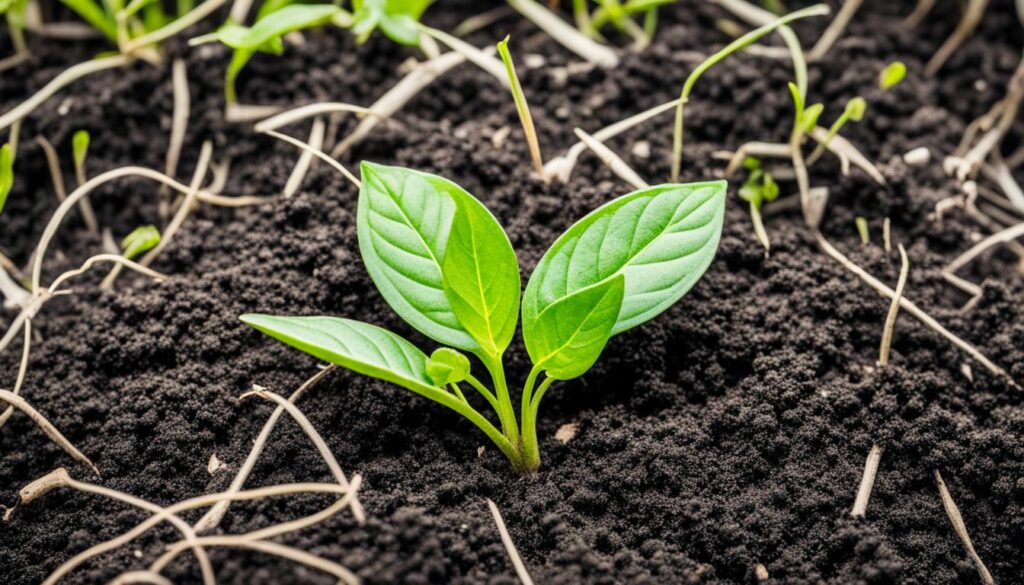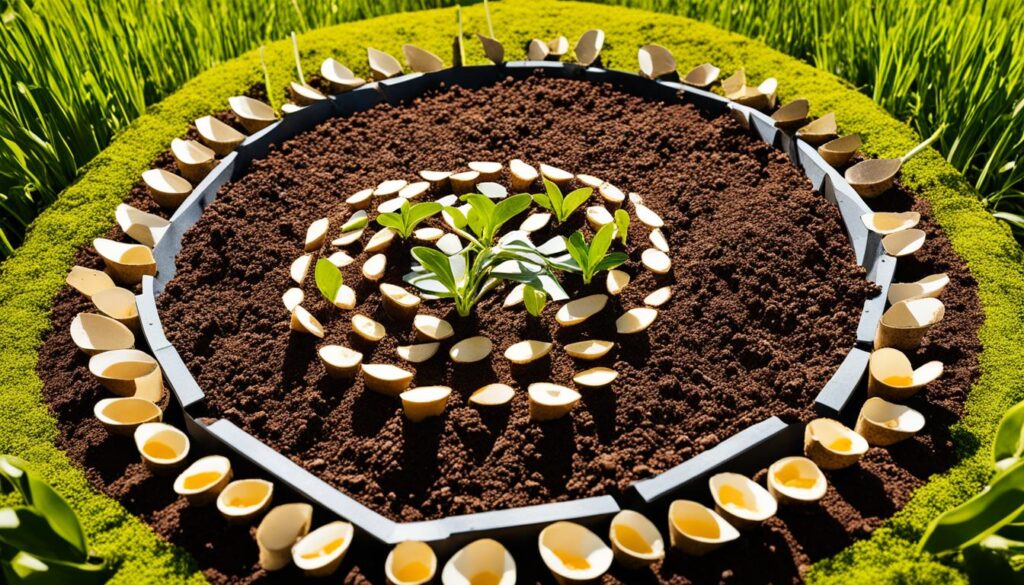Organic Fertilizers: Nourish Your Plants the Natural Way
Gardening lovers and those who care about the planet are choosing organic ways to grow their plants. Organic fertilizer is now a top pick as a green alternative to synthetic ones. But what’s so great about organic fertilizers for your plants and the earth? Let’s dive into the natural benefits of organic fertilizers and how to easily add them to your garden.
Key Takeaways
- Organic fertilizers are made from natural, renewable sources like plant and animal materials.
- Using organic fertilizers can improve soil health, promote sustainable gardening, and support thriving plant growth.
- Organic fertilizers are free from harmful chemicals, making them a safe and eco-friendly choice for your garden.
- Exploring the different types of organic fertilizers can help you find the perfect fit for your specific plant needs.
- Incorporating organic fertilizers into your gardening routine can be a rewarding and fulfilling experience.
What are Organic Fertilizers?
Understanding the Essence of Organic Fertilizers
Organic fertilizers are made from natural stuff like plants or animals. They feed your plants and help your garden be healthy and green. They don’t use fossil fuels and are better for the planet. These organic fertilizers work with nature to make plants grow strong and keep the soil healthy.
These fertilizers have important nutrients like nitrogen, phosphorus, and potassium. You can find these in things like compost, manure, and seaweed. Using natural fertilizers helps your garden grow and helps the planet too.
Choosing eco-friendly fertilizers helps your plants and the whole ecosystem. They make the soil better and cut down on harmful chemicals. With organic fertilizers, you can have a beautiful garden and help protect the Earth.
“Organic fertilizers are the key to unlocking the true potential of your garden, nourishing your plants with nature’s own bountiful resources.”
| Organic Fertilizer | Source | Key Nutrients |
|---|---|---|
| Compost | Decomposed plant and animal matter | Nitrogen, phosphorus, potassium |
| Manure | Animal waste | Nitrogen, phosphorus, potassium |
| Bone Meal | Ground animal bones | Phosphorus, calcium |
| Seaweed Extracts | Nutrient-rich seaweed | Micronutrients, growth hormones |
Benefits of Using Organic Fertilizers
Using organic fertilizers brings many benefits to your garden and the planet. They feed your plants and help make your garden sustainable.
Organic fertilizers are great for the environment. They come from things that can grow again, so they don’t use up non-renewable resources. They also don’t harm our water, air, or the balance of nature, making them a smart choice for sustainable gardening.
Organic fertilizers do more than just help the planet. They make soil healthier by keeping water and nutrients in the soil. They also help good bugs and worms live in the soil, which is good for plant roots.
- Improved soil structure and aeration
- Enhanced nutrient availability for better plant growth
- Increased resistance to pests and diseases
Organic fertilizers give plants the right mix of nutrients like nitrogen, phosphorus, and potassium. This makes your plants healthier, with better roots and leaves. Your garden will look better overall.
“Organic fertilizers are the key to unlocking the full potential of your garden, nourishing both your plants and the environment.”
Choosing organic fertilizers starts a journey of sustainable gardening. Your plants will grow well with nature, not against it.
Types of Organic Fertilizers
There are many organic fertilizer options for your garden. Each one has its own benefits and meets different plant needs. Let’s look at the various types that can make your garden flourish.
Exploring the Diverse Offerings
Compost is a dark, crumbly mix made from broken-down organic stuff. It adds important nutrients, improves soil structure, and helps microbes. Manure is full of organic stuff and nutrients. It slowly gives plants nitrogen, phosphorus, and potassium.
Bone meal is great for phosphorus and calcium. It helps roots grow strong and plants get stronger. Fish emulsion comes from fish waste and is full of nitrogen, phosphorus, and other nutrients. Plants absorb it quickly for a boost.
Seaweed and kelp fertilizers have lots of nutrients like trace minerals and growth helpers. They help roots grow, make plants stronger against stress, and keep them healthy.
With so many natural fertilizer choices, you can meet your garden’s specific needs for growth and health.
“Feeding your plants with high-quality organic fertilizers is like giving them a balanced, nutrient-rich diet – it nourishes them from the roots up, helping them thrive in a truly sustainable way.”
How to Use Organic Fertilizers
Using organic fertilizers can greatly improve your garden’s health and plant vitality. But, you need to know how to apply them right. Start by cleaning your soil of weeds and making it loose with a fork or tiller. Add organic matter to it. This makes the soil better for your plants to grow strong.
Application Methods for Organic Fertilizers
There are different ways to use organic fertilizers, each with its own benefits. Here are some common methods:
- Top-dressing: Spread the fertilizer on the soil and mix it in the top inch or two.
- Side-dressing: Put the fertilizer on the sides of your plants, 6-12 inches away from the stems.
- Incorporating into planting holes: Mix the fertilizer into the soil before planting to give your plants a nutrient boost.
When to apply organic fertilizers depends on your plants and the fertilizer type. Usually, start at the beginning of the growing season and keep applying regularly. This keeps your plants well-fed throughout the season.
“Feeding your plants with organic fertilizers is like giving them a natural, wholesome meal – it nourishes them from the roots up, promoting lush growth and vibrant blooms.”
By using these methods, you’ll make the most of organic fertilizers. Your garden will be healthy and full of life.
Tips for Choosing the Right Organic Fertilizer
Choosing the right organic fertilizer is key to a healthy garden. Here are some tips to help you pick the best one:
First, look at the nutrient content of the fertilizer. Different plants need different nutrients. A soil test can show what your garden lacks, helping you pick the right fertilizer.
Also, check the application requirements of the fertilizer. Some need special techniques or conditions to work well. Always read and follow the instructions for the best results.
- Understand the nutrient content and ensure it matches your plants’ needs
- Conduct a soil test to identify any nutrient deficiencies
- Follow the application requirements for the organic fertilizer
Keep these tips in mind to select the right organic fertilizer for your garden. This way, you can give your plants the nourishment they need to grow well.
“Healthy soil is the foundation for a thriving garden, and organic fertilizers are the key to unlocking its full potential.”
Debunking Common Misconceptions about Organic Fertilizers
There are many myths about organic fertilizers that need clearing up. These natural fertilizers are not slow, expensive, or less effective than synthetic ones.
One myth is that organic fertilizers don’t give plants enough nutrients quickly. But, they actually provide a steady supply of nutrients for a long time. This means your plants get what they need without losing it to the soil.
Another myth is that organic fertilizers cost too much. While they might be pricier upfront, they save money in the long run. They help your soil and plants stay healthy, which is good for the planet and your wallet.
Some people think organic fertilizers don’t work well. But, they actually do a lot of good for your garden. They make the soil better, help plants stay healthy, and support a healthy environment. They focus on long-term health, not just quick fixes.
Don’t let these organic fertilizer myths stop you from trying them out. Knowing the truth can help you make better choices for your garden and the earth.

Organic Fertilizers for Specific Plants
When you’re feeding your garden, it’s key to pick the right organic fertilizers for each plant type. Organic fertilizers vary in what they offer, depending on the plant’s needs. This ensures your garden grows strong and healthy.
Vegetables and Herbs
For veggies and herbs, go for balanced organic fertilizers. Compost and well-rotted manure are great because they give many nutrients. These help your plants grow well.
Fruits and Berries
Fruits and berries need more phosphorus to help flowers bloom and grow fruit. Bone meal and compost are perfect for these plants. They give them the nutrients they need.
Flowers and Ornamentals
For flowers and ornamentals, choose organic fertilizers that boost blooms and growth. Fish emulsion and seaweed-based products work well. They help your plants look their best.
Picking the right organic fertilizers for your plants makes sure they get what they need. This helps them grow to their best potential.
DIY Organic Fertilizer Recipes
For those who love gardening and care for the planet, making your own homemade organic fertilizers is a great idea. It’s a way to feed your plants with natural stuff and cut down on store-bought products. Let’s look at some easy recipes for organic fertilizers that can make your garden thrive.
Compost: Nature’s Treasure Trove
Compost is a simple yet powerful homemade organic fertilizer. Just mix kitchen scraps, yard waste, and other organic stuff in a bin or pile. Keep it damp and turn it often to help it break down. After a while, you can add this rich stuff to your soil, giving your plants the nutrients they need.
Homemade Fish Emulsion
Fish emulsion is another great choice. It’s a liquid fertilizer made from fish waste like bones and skin. Just soak the fish waste in water for weeks, then strain and mix it with water. This liquid can be used as a nutrient-rich plant tea for your plants.
Nutrient-Rich Plant Tea
For a fast and simple nutrient-rich plant tea, steep plants like comfrey leaves in water. After steeping, strain the liquid and mix it with water before giving it to your plants. This natural drink can give your garden a quick nutrient boost.
Using these DIY homemade organic fertilizers helps your plants and the planet too. With compost, fish emulsion, and nutrient-rich plant tea, you can make a garden that’s healthy and sustainable. It’s all thanks to nature’s power.

Organic Fertilizers vs. Synthetic Fertilizers
Choosing between organic and synthetic fertilizers is crucial for your garden. Knowing the differences helps you pick the right one for your goals and the planet.
Exploring the Key Distinctions
Organic fertilizers beat synthetic ones in many ways. They don’t harm the environment like synthetic ones do. Synthetic fertilizers can pollute water and cause harmful algae growth. Organic ones help soil health and prevent pollution.
Synthetic fertilizers give plants nutrients fast but can hurt soil health over time. They can kill good microorganisms and lower organic matter. Organic fertilizers release nutrients slowly and help soil stay healthy and diverse. This makes plants stronger and more resistant to problems.
“Organic fertilizers are a sustainable choice that nourish your plants while protecting the environment.”
Knowing the differences between organic and synthetic fertilizers helps you choose wisely. This leads to a healthier, more beautiful garden.
The Importance of Organic Fertilizers
Organic fertilizers are a top choice for those who love sustainable gardening and want their plants to grow well. They are made from natural stuff and are good for the planet. Learn more about their benefits.
Organic fertilizers are kind to the earth. They come from things that can grow again, so they don’t use up our natural resources or water. Using them helps make the soil healthy and full of good stuff for plants.
These fertilizers are great for the soil too. They add nutrients that make the soil better at holding water and growing strong roots. Plants that get these nutrients grow better and can fight off pests and sickness.
Organic fertilizers help plants grow strong and healthy. They give plants the right amount of nutrients slowly over time. This means your plants will have beautiful leaves and give you lots of food.
Using organic fertilizers is a big step towards a greener future. You’re helping your plants and the planet at the same time. It’s good for your garden and the earth.
“Organic fertilizers are the foundation of a healthy, vibrant garden that exists in harmony with nature.”
Tailoring Nutrient Needs for Different Plant Types
Choosing the right organic fertilizer is key for your plants. Different plants need different nutrients to grow well. Picking the right fertilizer can really help your plants.
| Plant Type | Recommended Organic Fertilizer |
|---|---|
| Vegetables | Compost, Manure, Bone Meal |
| Flowers | Blood Meal, Fish Emulsion, Seaweed Extract |
| Shrubs and Trees | Compost, Aged Bark, Alfalfa Meal |
Knowing what your plants need helps you pick the best organic fertilizers. This way, you make sure your plants and soil are healthy.
Conclusion
Organic fertilizers are a great way to help your plants grow strong and healthy. They offer a natural and sustainable way to care for your garden. By using them, you can make your garden greener and support a healthier planet.
Choosing organic fertilizers means you can pick from many options, both store-bought and DIY. These products are made from plants and help your soil and plants in many ways. They add nutrients, help good bugs, and make your garden more vibrant.
As more people want to garden in a green way, using organic fertilizers is a smart choice. It’s a step towards caring for the earth and your plants better. By adding organic fertilizers to your garden, you help your plants grow well and make a positive change for the environment.
Let nature work for you and watch your garden thrive with organic fertilizers. They are a powerful way to make your garden beautiful and eco-friendly.
FAQ
What are organic fertilizers?
What are the benefits of using organic fertilizers?
What are the different types of organic fertilizers?
How should organic fertilizers be applied?
How do I choose the right organic fertilizer for my plants?
What are some common misconceptions about organic fertilizers?
How can I use organic fertilizers for different types of plants?
Can I make my own organic fertilizers at home?
Source Links
- https://www.nutriharvest.com/blogs/news/nourishing-your-soil-naturally-the-advantages-of-organic-fertilizers – Nourishing Soil Naturally: Organic Fertilizers
- https://www.tribhakti.com/organic-fertilizer-nurturing-your-garden-the-natural-way/ – Organic Fertilizer: Nurturing Your Garden the Natural Way | PT. Tribhakti Inspektama
- https://sustainableholly.com/15-easy-organic-fertilizers-to-make-at-home/ – 15 Easy Organic Fertilizers to Make at Home – Sustainable Holly
- 10 Must-Have Blooms for Your 2025 Garden
- The Health Advantages of Gardening You Need to Know
- How to Create a Small Vegetable Garden Layout Plan: A Beginner’s Guide
- DIY Garden Projects for Small Spaces: Upcycling Ideas to Maximize Your Garden
- Watering Techniques for Small Gardens: Ensuring Your Plants Thrive
- Small Border Plants for Landscaping: Adding Beauty and Functionality to Your Garden
- Year-Round Small Space Gardening: Seasonal Planting Tips for Maximum Harvest
- Essential Tools for Small-Space Gardening: What You Really Need
- The Ultimate Guide to Container Vegetables: What to Grow in Small Spaces
- Budget-Friendly Gardening: How to Create a Thriving Garden on a Tight Budget
- How to Optimize Sunlight in Small Gardens: Tips for Better Plant Growth
- DIY Vertical Planters: Creative Ideas for Small Space Gardening
- Companion Planting for Small Vegetable Gardens: Boost Growth and Deter Pests
- Container Gardening Essentials: Choosing the Right Pots, Soil, and Plants
- Vertical Gardening Techniques: Maximizing Your Small Space with Climbers and Vines
- How to Build a Raised Bed Garden in a Small Backyard: Step-by-Step Guide
- The Best Vegetables for Small-Space Gardens: High-Yield Varieties You Need to Grow
- Smart Vegetable Garden Layouts for Small Spaces: Maximizing Your Green Thumb in Compact Areas
- 40. Best Practices for Managing a Sustainable Garden Year-Round
- Building a Wildlife Pond for Biodiversity
- Advanced Techniques in Sustainable Gardening
- How to Create a No-Till Garden
- The Mental Health Benefits of Gardening
- Using Technology to Enhance Sustainable Gardening
- Getting Certified Organic: Steps and Benefits

Leave a Reply